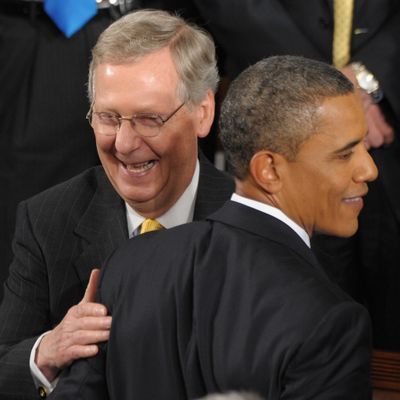
Over the last generation and a half, American politics has been gradually reshaped as the two parties have refashioned themselves from loose coalitions into tightly knit factions. But the culture of American politics has lagged far behind the reality. This is true among voters, who yearn for politicians who promise vaguely to turn back the clock and restore bipartisan compromise. It is even true among political elites, who continue to regard the completely rational logic of partisan opposition as a strange fluke that could be reversed with just the right social or political circumstances. Washington Post columnist Dana Milbank once again endorses the hardy Beltway opinion that “Washington is broken because personal bonds have unraveled.” Wall Street Journal columnist Gerald Seib today likewise argues that a Republican takeover of the Senate might be just the trick to restore bipartisan cooperation.
Seib’s column is revealing for the buried assumptions it brings to the surface. He argues that giving Republicans responsibility might make them hesitant to maintain their stance of total opposition:
When the two parties have an equal share of power, they also have an equal share of responsibility for what does and doesn’t get done—and have to worry about taking the blame in the even more important 2016 election if things don’t get done. For Mr. Obama, in particular, full GOP control of Congress might well shift Republicans’ focus from stopping him to making things happen.
Seib’s argument sounds plausible — if Republicans fully control Congress, voters might blame them for a lack of bipartisan agreement, thus giving them an incentive to cooperate with Obama. But is this actually true? In fact, political scientists have found that voters hold the president solely responsible for outcomes. This does not give a Congress controlled by the opposing party an incentive to cooperate — it gives Congress controlled by the opposing party an incentive not to cooperate.
Indeed, most Americans do not even know which party controls which chamber of Congress. So the notion that Republicans have to worry about the blame for gridlock lacks even surface plausibility.
A more subtle problem, in addition to the lack of incentives, is that Washington already has divided control. Now, to be sure, Republicans control just one chamber of Congress at the moment. Seib argues that the calculus might change if they win control of the other chamber as well.
For this to be true, you would have to imagine that there are deals that could be struck between the Republican House and President Obama that the Democratic Senate would block but that a Republican Senate would agree to. What reason is there to think that any such deal exists? Has Harry Reid actually blocked an agreement between John Boehner and Obama? Seib suggests two:
In a new era of divided government, the most intriguing possibilities would lie in two areas: overhaul of the immigration system and a revamping of the tax code, at least the corporate tax.
He does not explain how a Republican Senate would break the Boehner-Obama logjam on corporate tax reform, so that possibility remains hypothetical. On immigration reform, we don’t have to imagine what would happen. We know for certain that the Senate is not standing in the way of a Boehner-Obama immigration deal because the Senate already passed immigration reform — with 68 votes, no less.
Washington is awash in nostalgic memories of congenial dinner parties and tales of Tip O’Neill and Ronald Reagan knocking back drinks together, and largely blind to the cold rationalism undergirding its current circumstances. The good old days are not coming back.
Update: Ron Fournier, a priest in the cult of Washington bipartisanship, responds in a highly telling way:
Here is what is so telling. My argument is descriptive, not normative. I don’t oppose bipartisan compromise on the merits. Indeed, I’d be fine with corporate tax reform, and extremely happy if Congress passed immigration reform. I am simply arguing that flipping the Senate would not improve the chances of such cooperation.
That Fournier confuses descriptive accounts with normative preferences tells us a great deal about his own confused analysis. He desperately wants bipartisanship, so he declares that it can happen, and rejects all analysis to the contrary. Indeed, he assumes that anybody who argues that his dream is unrealistic must be similarly motivated. He is completely immune to empirical persuasion. In this way, he is the ultimate incarnation of the cult-like faith in bipartisanship exhibited by his ideological tribe.






























